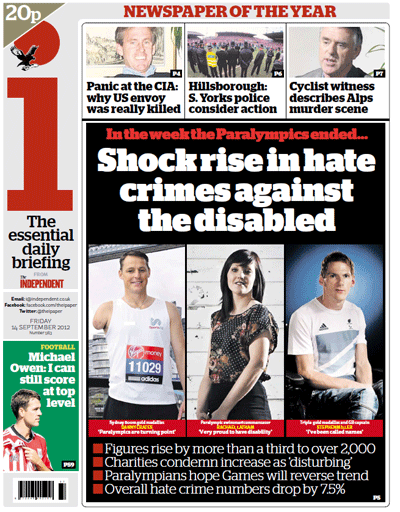i Editor's Letter: Crimes against disabled people

Your support helps us to tell the story
From reproductive rights to climate change to Big Tech, The Independent is on the ground when the story is developing. Whether it's investigating the financials of Elon Musk's pro-Trump PAC or producing our latest documentary, 'The A Word', which shines a light on the American women fighting for reproductive rights, we know how important it is to parse out the facts from the messaging.
At such a critical moment in US history, we need reporters on the ground. Your donation allows us to keep sending journalists to speak to both sides of the story.
The Independent is trusted by Americans across the entire political spectrum. And unlike many other quality news outlets, we choose not to lock Americans out of our reporting and analysis with paywalls. We believe quality journalism should be available to everyone, paid for by those who can afford it.
Your support makes all the difference.
There is one, tiny saving grace about today's story detailing the shocking rise in hate crimes against disabled people: the figures refer to 2011. One has to believe that this year, the figures will reflect a Paralympics-inspired drop in such barbarism.
I also understand that some of the rise is attributable to the greater confidence of victims coming forward, but there is no hiding from a one-third rise year on year. It is simply shameful.
Who are the attackers? Are they the people on my 27 bus? Are they you, or me? Back in the dark ages of my school years, like many, I was guilty of the type of ignorance that saw us all bandy around words like "flid" or "spaz" without ever knowing what a thalidomide victim, or a person with cerebral palsy, was. But, attack a person for being disabled? We were ignorant, not Neanderthal.
One positive by-product of the subsequent rise in political correctness is that we were educated out of our ignorance. For many years I never heard any of the many derogatory terms used against disabled people (I do not here see the need for "people with disability"). That is, until recently.
Among some of our young, insults like "spaz" and most commonly, "retarded", are bandied about in the same pejorative way that "gay" is. Unlike us back then, they know what the words mean. However, confront a teen, and they will insist they are neither anti-gay nor anti-disabled. And, they invariably are not. But it is a smaller leap to hate crimes from bandying such words around than it would be if we all understood how dangerous apparently innocuous language can be.
Join our commenting forum
Join thought-provoking conversations, follow other Independent readers and see their replies
Comments